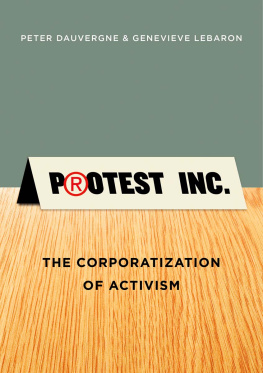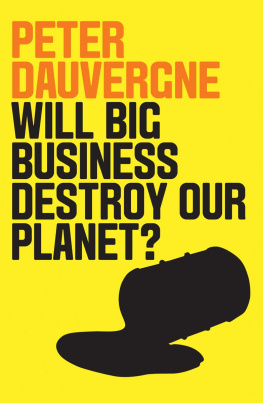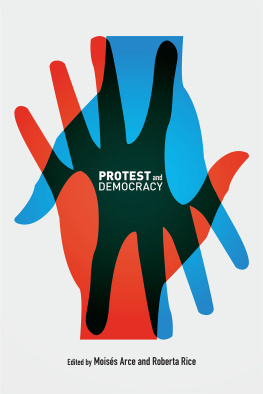Protest Inc.
Copyright Peter Dauvergne and Genevieve LeBaron 2014
The rights of Peter Dauvergne and Genevieve LeBaron to be identified as Authors of this Work have been asserted in accordance with the UK Copyright, Designs and Patents Act 1988.
First published in 2014 by Polity Press
Polity Press
65 Bridge Street
Cambridge CB2 1UR, UK
Polity Press
350 Main Street
Malden, MA 02148, USA
All rights reserved. Except for the quotation of short passages for the purpose of criticism and review, no part of this publication may be reproduced, stored in a retrieval system, or transmitted, in any form or by any means, electronic, mechanical, photocopying, recording or otherwise, without the prior permission of the publisher.
ISBN-13: 978-0-7456-8119-1
A catalogue record for this book is available from the British Library.
The publisher has used its best endeavours to ensure that the URLs for external websites referred to in this book are correct and active at the time of going to press. However, the publisher has no responsibility for the websites and can make no guarantee that a site will remain live or that the content is or will remain appropriate.
Every effort has been made to trace all copyright holders, but if any have been inadvertently overlooked the publisher will be pleased to include any necessary credits in any subsequent reprint or edition.
For further information on Polity, visit our website: www.politybooks.com
Contents
Acknowledgments
A host of friends and colleagues joined us as we sailed well beyond our discipline of international relations to research Protest Inc. Without their guidance we would surely have been shipwrecked on the shoals of interdisciplinarity. We wish to thank Alan Sears for sharing his research and for many inspiring conversations. V. Spike Peterson, David McNally, Susanne Soederberg, Marcus Taylor, Gavin Fridell, Stephen Gill, Isabella Bakker, Leo Panitch, Greg Albo, and Alan Nasser gave perceptive advice and encouragement and pointed to crucial sources.
Conversations with many colleagues at the University of British Columbia were very helpful as well, notably with Asha Kaushal (especially for locating legislation for chapter 3), Sara Koopman (especially chapter 3), Linda Coady, Jonathan Gamu, Justin Alger, Dborah Barros Leal Farias, Jennifer Allan, and Charles Roger. Special thanks should also go to Catherine Dauvergne, Sbastien Rioux, Jane Lister, Kate Neville, Sara Elder, and Adrienne Roberts for their support and judicious feedback on book drafts. Valuable too was the wise counsel of the five anonymous reviewers for Polity Press.
Expert research support was provided by Elim Wong, Reference Librarian, UBC Law; Zo Veater and Jonathon Bell, Advice and Information Officers, Liberty, UK; and Nathan Tempey, National Lawyers Guild. Shahrouz Hafez assisted adeptly with fact-checking. We are indebted as well to the world-class staff at the Liu Institute for Global Issues: Julie Wagemakers, Sally Reay, Patty Gallivan, Timothy Shew, and Andrea Reynolds.
Finally, we need to thank Louise Knight, David Winters, and Pascal Porcheron of Polity Press for steering us so expertly.
CHAPTER ONE
Where are the Radicals?
Over the last two decades activist organizations have increasingly come to look, think, and act like corporations. You may well find this claim upsetting. Yet we go even further, arguing that the corporatization of activism is deepening and accelerating across all causes and cultures. Rarely now do career activists call for a new international economic order, or a world government, or an end to multinational corporations. Only a select few on the fringes, in the words of Greenpeace cofounder Bob Hunter, still struggle to mindbomb the world to form a new global consciousness.
More and more activists, especially those toiling inside large advocacy organizations, are instead speaking in market-friendly language. They are calling for a gentler capitalism for fair trade, for certification, for eco-markets. The buzz is about the aid of rock stars and the benevolence of billionaires. Solutions to global problems involve campaigns for ethical purchasing: to brand social causes and sell feelings of doing good to the cappuccino class.
Without a doubt most activists still want to speak truth to power. But nowadays they are entangled in this power. Unthinkable a few decades back, partnerships with big-brand companies Walmart, McDonalds, Nike are now common, even expected. The global WWF Network of activists, as just one example among many, receives funding from and works closely with the Coca-Cola Company. WWF leaders do not hide the reason for joining forces. Coke, explains Gerald
A Coca-Cola World
Why is this happening? Why is corporatization affecting some advocacy organizations more than others? What are the consequences for the nature and power of activism? The answers, as we reveal, are complex, with many activists fighting back. Still, looking across the surface of global activism, we see three processes that are interacting with markets and politics to corporatize activism: the securitization of dissent (chapter 3); the privatization of social life (chapter 4); and the institutionalization of activism (chapter 5).
Together, these interlocking processes are reconfiguring power and resistance globally, as firms engage social forces through corporate social responsibility, as governments cut social services and devolve authority to companies, as consumerism spreads, and as states suppress public dissent. The result is a seismic shift in the nature of activism worldwide. Not only are more and more corporations financing and partnering with activist groups, but activists are increasingly communicating, arguing, and situating goals within a corporatized frame. And more and more activists are seeing corporate-friendly options as logical and effective strategies for achieving their goals.
This does not mean that activists have capitulated to corporations: corporate malpractice continues to draw their ire. Within every movement, many activists are challenging the values and institutions of capitalism. And many examples exist of successful efforts to slow or reverse corporatization. Worldwide, both organized and spontaneous uprisings remain common too, with social media tools such as Facebook and Twitter rallying hundreds of thousands of people to oppose rigged elections, decaying dictatorships, and corporate pillage. If anything, because social unrest tends to cluster and come in waves, in the future we would expect even more and larger public protests as the world population rushes toward 10 billion people, as communication technologies and economies continue to globalize, and as citizens react angrily to the hardships of an ever adjusting world economy.
Nonetheless, although it is a contested, uneven, and in no way inevitable process, the overall trend, we argue in this book, is toward a corporatization of activism, where the agendas, discourse, questions, and proposed solutions of human rights, gender equality, social justice, animal rights, and environmental activist organizations increasingly conform with, rather than challenge, global capitalism. Some of this reflects self-censorship under threat of government audits, business retribution, and the pressures of austerity; but much also arises from self-evaluation by activists of what is feasible and what is effective.










